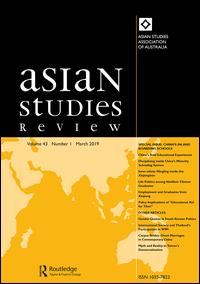
Su Yun Kim
Asian Studies Review (online, Aug 2020)
Abstract: This article explores Korean cinema from the 1940s to the 1960s with a focus on films about Korean–Japanese intimacy. In parallel with the promotion of Korean–Japanese intermarriage by the Japanese colonial government, a number of films produced during the colonial period portrayed intimate Korean–Japanese relationships, including marriages, friendships and affective communities. These representations disappeared immediately after the liberation, but they reappeared in the 1960s in South Korean cinema, owing to a shift in the government’s attitude toward Japan. Among Korean movies shot in Japan or featuring Japanese culture, colonial intimacy was a popular topic, particularly when it depicted romance between Korean men and Japanese women against the background of colonial history. This article argues that manifestations of colonial intimacy in Korean cinema between the 1940s and the 1960s – the transwar period – had a clear affinity with one another, portraying diverse emotions and affective relationships even in films featuring a propagandistic or nationalist militarised masculinity. I also highlight the inconsistencies of this period: whereas pre-1945 movies focused on mutual support within affective communities, 1960s works more strongly foregrounded male heroes. All of these representations, however, critically reflect on the sociopolitical conditions of colonialism, the civil war and the Cold War.
About the author: Su Yun Kim was a HYI Visiting Scholar from 2019-20.
